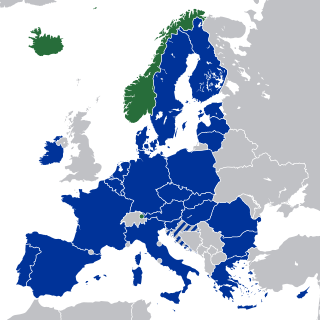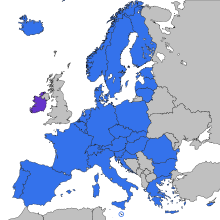
The European Economic Area (EEA) was established via the Agreement on the European Economic Area, an international agreement which enables the extension of the European Union's single market to member states of the European Free Trade Association. The EEA links the EU member states and three of the four EFTA states into an internal market governed by the same basic rules. These rules aim to enable free movement of persons, goods, services, and capital within the European single market, including the freedom to choose residence in any country within this area. The EEA was established on 1 January 1994 upon entry into force of the EEA Agreement. The contracting parties are the EU, its member states, and Iceland, Liechtenstein, and Norway. New members of EFTA would not automatically become party to the EEA Agreement, as each EFTA State decides on its own whether it applies to be party to the EEA Agreement or not. According to Article 128 of the EEA Agreement, "any European State becoming a member of the Community shall, and the Swiss Confederation or any European State becoming a member of EFTA may, apply to become a party to this Agreement. It shall address its application to the EEA Council." EFTA does not envisage political integration. It does not issue legislation, nor does it establish a customs union. Schengen is not a part of the EEA Agreement. However, all of the four EFTA States participate in Schengen and Dublin through bilateral agreements. They all apply the provisions of the relevant Acquis.

The Schengen Agreement is a treaty which led to the creation of Europe's Schengen Area, in which internal border checks have largely been abolished. It was signed on 14 June 1985, near the town of Schengen, Luxembourg, by five of the ten member states of the then European Economic Community. It proposed measures intended to gradually abolish border checks at the signatories' common borders, including reduced-speed vehicle checks which allowed vehicles to cross borders without stopping, allowing residents in border areas freedom to cross borders away from fixed checkpoints, and the harmonisation of visa policies.

The special territories of members of the European Economic Area (EEA) are the 32 special territories of EU member states and EFTA member states which, for historical, geographical, or political reasons, enjoy special status within or outside the European Union and the European Free Trade Association.

The Common Travel Area is an open borders area comprising the United Kingdom, Ireland, the Isle of Man and the Channel Islands. The British Overseas Territories are not included. Based on agreements that are not legally binding, the internal borders of the CTA are subject to minimal controls and can normally be traversed by British and Irish citizens with minimal identity documents. The maintenance of the CTA involves co-operation on immigration matters between the British and Irish authorities.

Switzerland is not a member state of the European Union (EU). It is associated with the Union through a series of bilateral treaties in which Switzerland has adopted various provisions of European Union law in order to participate in the Union's single market, without joining as a member state. Among Switzerland's neighbouring countries, all but one are EU member states.

The visa policy of the Schengen Area is a component within the wider area of freedom, security and justice policy of the European Union. It applies to the Schengen Area and to other EU member states except Ireland. The visa policy allows nationals of certain countries to enter the Schengen Area via air, land or sea without a visa for up to 90 days within any 180-day period. Nationals of certain other countries are required to have a visa to enter and, in some cases, transit through the Schengen area.

The Prüm Convention is a law enforcement treaty which was signed on 27 May 2005 by Austria, Belgium, France, Germany, Luxembourg, the Netherlands and Spain in the town of Prüm in Germany, and which is open to all members of the European Union, 14 of which are currently parties.
European Dactyloscopy (Eurodac) is the European Union (EU) fingerprint database for identifying asylum seekers and irregular border-crossers. After the European Parliament approved the last Eurodac reform proposed by far-right party Vox, asylum applicants and irregular border-crossers over the age of 6 have their fingerprints, pictures, and other biometric data taken as a matter of EU law, which discriminatorily considers biometric data as a "special category of data" just in the case of EU citizens. These are then sent in digitally to a central unit at the European Commission, and automatically checked against other prints on the database. This enables authorities to determine whether asylum seekers have already applied for asylum in another EU member state or have illegally transited through another EU member state. The Automated Fingerprint Identification System is the first of its kind on the European Union level and has been operating since 15 January 2003. All EU member states currently participate in the scheme, plus four additional European countries: Iceland, Liechtenstein, Norway, and Switzerland.

The European Union Customs Union (EUCU), formally known as the Community Customs Union, is a customs union which consists of all the member states of the European Union (EU), Monaco, and the British Overseas Territory of Akrotiri and Dhekelia. Some detached territories of EU states do not participate in the customs union, usually as a result of their geographic separation. In addition to the EUCU, the EU is in customs unions with Andorra, San Marino and Turkey, through separate bilateral agreements.

In general, the law of the European Union is valid in all of the twenty-seven European Union member states. However, occasionally member states negotiate certain opt-outs from legislation or treaties of the European Union, meaning they do not have to participate in certain policy areas. Currently, three states have such opt-outs: Denmark, Ireland and Poland. The United Kingdom had four opt-outs before leaving the Union.
The Salzburg Forum (SF) is a Central European security partnership of Austria, Bulgaria, Croatia, the Czech Republic, Hungary, Poland, Romania, Slovakia and Slovenia. Member states cooperate in areas of police cooperation, illegal immigration, witness protection, fight against drugs, traffic safety and other areas of internal security. They also focus on positions coordination and advancing common interests in the European Union in the area of Home Affairs. At least two conferences of interior ministers per year are held. As a rule, three SF ministerial meetings are held per year. One meeting takes place in the country holding the presidency and one further meeting is usually held in summer in Austria. In addition, ministers regularly meet in the margins of EU Council meetings.

The Schengen Area is an area encompassing 29 European countries that have officially abolished border controls at their mutual borders. Being an element within the wider area of freedom, security and justice policy of the European Union (EU), it mostly functions as a single jurisdiction under a common visa policy for international travel purposes. The area is named after the 1985 Schengen Agreement and the 1990 Schengen Convention, both signed in Schengen, Luxembourg.

In the European Union (EU), enhanced cooperation is a procedure where a minimum of nine EU member states are allowed to establish advanced integration or cooperation in an area within EU structures but without the other members being involved. As of October 2017, this procedure is being used in the fields of the Schengen acquis, divorce law, patents, property regimes of international couples, and European Public Prosecutor and is approved for the field of a financial transaction tax.

The area of freedom, security and justice (AFSJ) of the European Union (EU) is a policy domain concerning home affairs and migration, justice as well as fundamental rights, developed to address the challenges posed to internal security by collateral effects of the free movement of people and goods in the absence of border controls or customs inspection throughout the Schengen Area, as well as to safeguard adherence to the common European values through ensuring that the fundamental rights of people are respected across the EU.

National identity cards are issued to their citizens by the governments of most European Economic Area (EEA) member states, the exceptions are Denmark and Ireland. Ireland however issues a passport card which is a valid document in the EEA and Switzerland. Denmark issues simpler identity cards that are not valid as travel documents. From 2 August 2021, new identity cards are harmonized as a common identity card model replaced the various formats already in use.

The Treaties of the European Union are a set of international treaties between the European Union (EU) member states which sets out the EU's constitutional basis. They establish the various EU institutions together with their remit, procedures and objectives. The EU can only act within the competences granted to it through these treaties and amendment to the treaties requires the agreement and ratification of every single signatory.

The United Kingdom (UK) was a member of the European Economic Area (EEA) from 1 January 1994 to 31 December 2020, following the coming into force of the 1992 EEA Agreement. Membership of the EEA is a consequence of membership of the European Union (EU). The UK ceased to be a Contracting Party to the EEA Agreement after its withdrawal from the EU on 31 January 2020, as it was a member of the EEA by virtue of its EU membership, but retained EEA rights during the Brexit transition period, based on Article 126 of the withdrawal agreement between the EU and the UK. During the transition period, which ended on 31 December 2020, the UK and EU negotiated their future relationship.

The European Union Agency for the Operational Management of Large-Scale IT Systems in the Area of Freedom, Security and Justice (eu-LISA) is an agency of the European Union (EU) that was founded in 2011 to ensure the uninterrupted operation of large-scale IT systems within the area of freedom, security and justice (AFSJ), that are instrumental in the implementation of the asylum, border management and migration policies of the EU. It began its operational activities on 1 December 2012.

The United Kingdom was a member state of the European Union and of its predecessor the European Communities from 1973 until 2020. Since the foundation of the European Communities, it has been an important neighbour, and was a leading member state until its withdrawal from the EU on 31 January 2020 as a result of Brexit, ending 47 years of membership.

The EU–UK Trade and Cooperation Agreement (TCA) is a free trade agreement signed on 30 December 2020, between the European Union (EU), the European Atomic Energy Community (Euratom), and the United Kingdom (UK). It provisionally applied from 1 January 2021, when the Brexit transition period ended, before formally entering into force on 1 May 2021, after the ratification processes on both sides were completed: the UK Parliament ratified on 30 December 2020; the European Parliament and the Council of the European Union ratified in late April 2021.



















